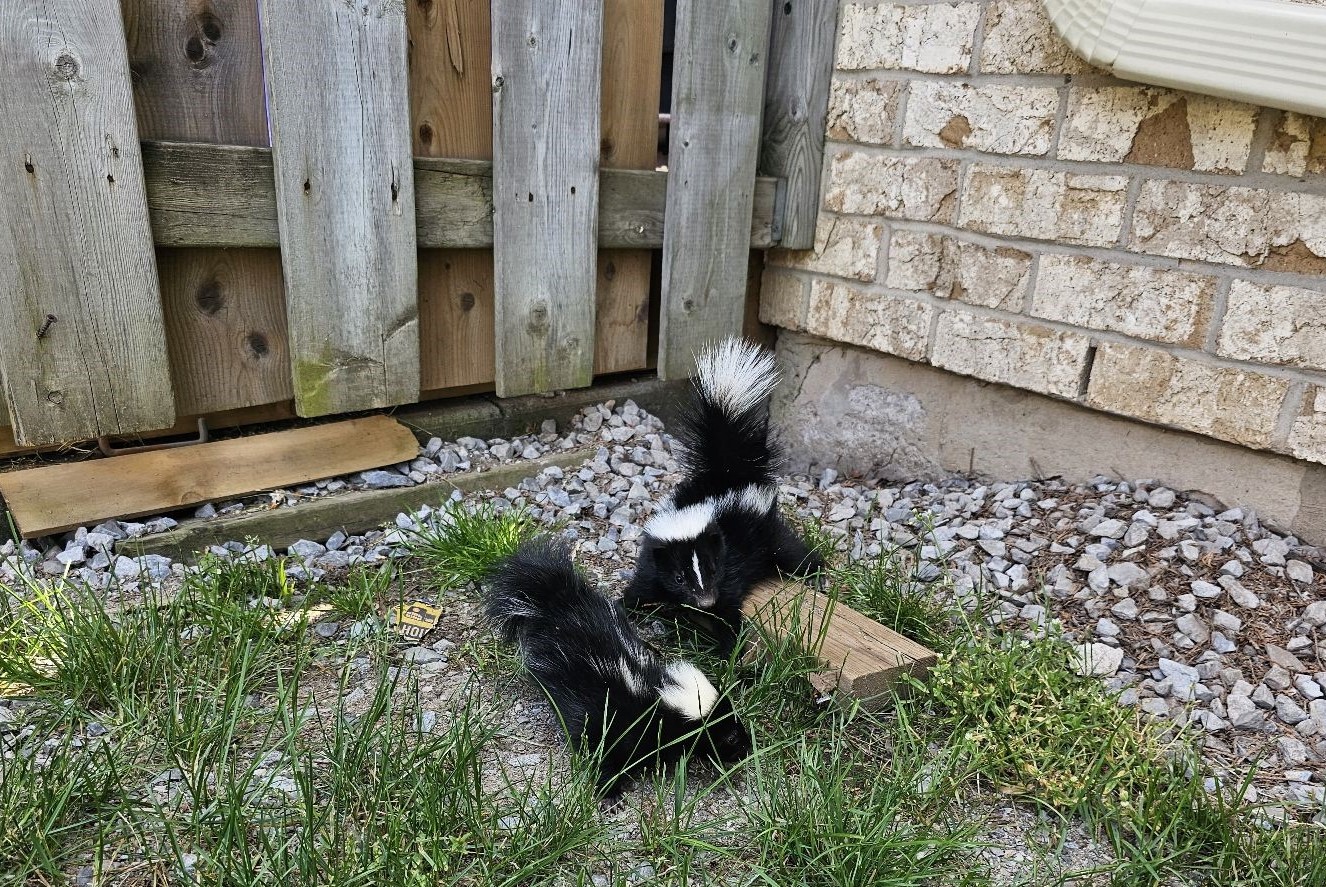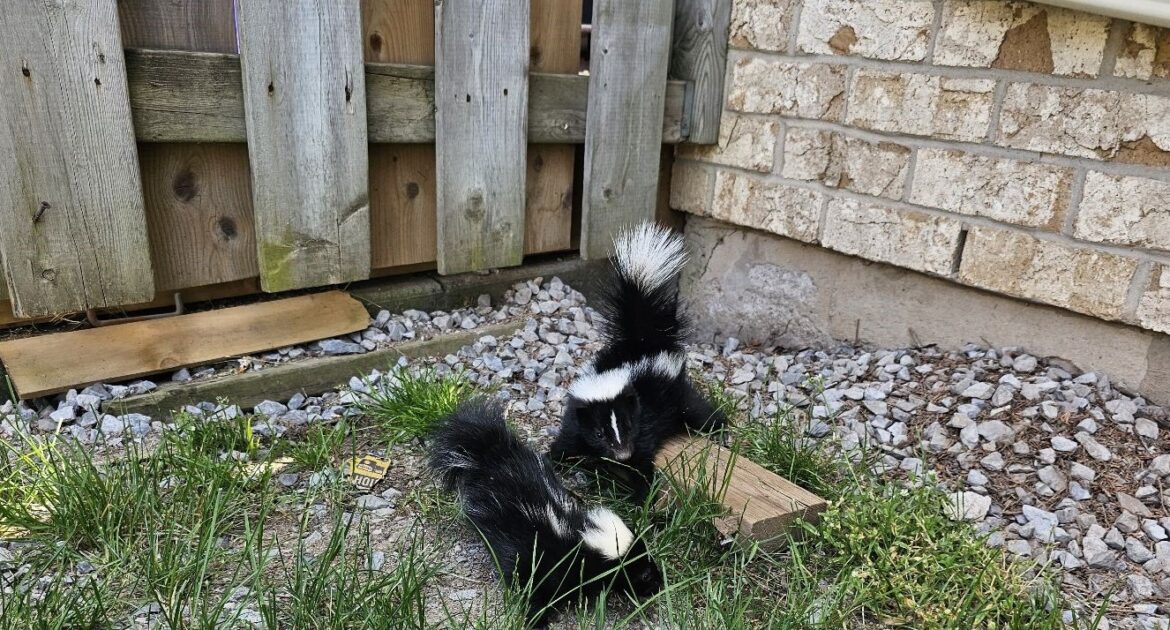When winter sets in, many homeowners in Minnetonka begin to wonder about the activities of local wildlife, especially skunks. Although these animals are known for their distinct odor, their behavior during the colder months can be less understood.
Skunks do not hibernate, but they become significantly less active in the winter, often staying in their dens for extended periods. It’s quite common for skunks to seek shelter in burrows, which might be naturally dug or left behind by other animals. This behavior is a key survival strategy as it helps them stay warm and conserve energy.
If you notice signs of a skunk in winter, such as tracks in the snow or the faint smell of their spray, it may be time to consider professional help. Relying on Skedaddle for wildlife removal in Minnetonka ensures that any skunk issues are handled safely and effectively. With the right expertise, you can manage these nocturnal visitors without causing harm to them or your property. It’s always best to turn to professionals who understand the habits of skunks, especially how they burrow in the ground and seek refuge during winter months.
The Winter Habits of Skunks
Skunks are known for their black and white fur and, of course, their notorious spray. But not everyone is familiar with how these animals behave in the wintertime. During the colder months, skunks don’t hibernate like some other animals. Instead, they enter a state called torpor, which is a period of reduced activity and metabolic rate. This means that while they are less active, they’re not in a deep sleep for the entire season.
Skunks’ ability to go into torpor allows them to conserve energy during the coldest parts of the year. They will often stay in their dens for extended periods, only venturing out during warmer spells to find food. It’s during these times that you might see signs of skunks on your property. These signs might include tracks in the snow or disturbances in your garden where they may forage for food.
Some people might assume that because skunks do not fully hibernate, they remain highly active during winter. However, this is not the case. Their activity is significantly reduced. Understanding this behavior is crucial for managing wildlife removal effectively, as it can help in predicting their movements and planning the best strategies for humane control.
Why Do Skunks Burrow in the Ground?
Skunks are natural burrowers, and they often create dens underground. These dens are used for shelter and to raise their young, providing a safe space away from predators and the elements. In Minnesota, skunks will often choose quiet, undisturbed areas to dig their dens. This could include places like under decks, in wood piles, or in dense shrubbery.
During the winter, skunks might burrow deeper into the ground or find existing burrows to take shelter in. The earth provides insulation against the cold, helping them maintain a more stable environment during torpor. Homeowners might notice signs of digging or the presence of skunks when snows melt and temperatures warm up, prompting these animals to become slightly more active.
If you’re worried about skunks burrowing around your home, it’s essential to monitor the situation closely. While these animals generally prefer to avoid humans, their presence can sometimes lead to conflicts or damage to property. Recognizing the signs of their activity can help you take the necessary steps to address any issues before they escalate.
How Skunks Impact Homes and Tips for Prevention
Skunks may not pose a direct threat, but their presence near homes can cause a range of problems. From property damage to health concerns, understanding their behavior and taking action can prevent conflicts.
How Skunks Can Affect Your Home:
- Lawn and Garden Damage: Skunks love to dig for insects, which can leave your yard looking torn up and messy.
- Structural Issues: Burrowing under decks, sheds, or foundations can destabilize structures.
- Skunk Spray: Skunks spray when they feel threatened. The odor is overwhelming, hard to remove, and can linger for days.
- Disease Risks: Skunks can carry rabies and other diseases, which can pose a hazard to humans and pets.
Tips to Prevent Skunk Conflicts:
- Secure Food Sources:
- Use sturdy, lockable trash bins.
- Avoid leaving pet food or birdseed outside overnight.
- Seal Off Potential Dens:
- Block access under decks, sheds, and porches.
- Keep wood and debris piles tidy and elevated.
- Maintain Your Property:
- Keep your yard well-lit and free of fallen fruit or food scraps that might attract skunks.
By staying proactive with these measures, you can reduce the likelihood of skunks becoming unwanted visitors on your property. If you’re dealing with skunk problems or need expert advice, consider reaching out to wildlife control professionals for safe, humane solutions.
The Role of Skedaddle in Effective Wildlife Control
At Skedaddle, we take wildlife control seriously, and our approach to dealing with skunks is rooted in humane and ethical practices. We understand that every situation is unique, and we tailor our solutions to meet the specific needs of our clients. Our team of experts has years of experience in safely and effectively managing skunk activity around homes and properties.
Our process begins with a thorough assessment of your property to identify any signs of skunk activity. This includes locating dens or entry points and understanding the extent of their presence. With this information, we can develop a strategic plan to address the issue. Our methods focus on removing the animals without causing harm, and we prioritize exclusion techniques to prevent future encounters.
Our commitment to humane practices sets us apart from other services. We believe in respecting wildlife while protecting human interests, and our techniques have been designed to ensure the safety and well-being of both animals and humans. By choosing Skedaddle, you can trust that we will handle your skunk concerns with professionalism and care.
Why Skedaddle Is the Best Choice for Wildlife Removal in Minnetonka
Choosing the right wildlife control service is crucial for resolving skunk issues effectively. At Skedaddle, we offer a level of expertise and dedication that is unmatched in the industry. Our team is trained to handle a wide range of wildlife concerns with precision and care, ensuring the best outcomes for our clients.
Our emphasis on humane removal techniques and exclusion strategies means that we not only solve the immediate problem but also prevent future occurrences. We understand the importance of maintaining a safe and comfortable living environment, and our methods reflect our commitment to achieving this goal.
In addition to our technical skills, we pride ourselves on providing excellent customer service. We work closely with homeowners to address their concerns and provide guidance every step of the way. When you choose Skedaddle, you’re choosing a company that prioritizes your needs and values your trust.
Skedaddle in Minnesota is Here to Help
Understanding the habits and behaviors of skunks during the colder months is essential for managing any potential conflicts with these animals. While they enter a state of torpor and reduce their activity, skunks can still pose challenges for homeowners in Minnetonka. From damage to lawns and gardens to the risk of spray, these animals can become unwelcome guests when they venture too close to homes.
However, with the right strategies and support from Skedaddle, you can effectively manage skunk activity and protect your property. Our commitment to humane wildlife control ensures that both the animals and your home are treated with respect and care. If you’re experiencing issues with skunks or just want to learn more about our services, reach out to us today and discover why Skedaddle is the trusted choice for wildlife control in Minnetonka.




